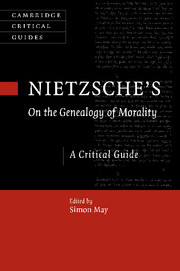Book contents
- Frontmatter
- Contents
- Contributors
- Acknowledgements
- Note on texts, translations, and references
- Introduction
- Chapter 1 The future of evil
- Chapter 2 On the nobility of Nietzsche’s priests
- Chapter 3 The genealogy of guilt
- Chapter 4 Why Nietzsche is still in the morality game
- Chapter 5 Who is the “sovereign individual”? Nietzsche on freedom
- Chapter 6 Ressentiment and morality
- Chapter 7 The role of life in the Genealogy
- Chapter 8 The relevance of history for moral philosophy
- Chapter 9 Why would master morality surrender its power?
- Chapter 10 “Genealogy” and the Genealogy
- Chapter 11 The promising animal
- Chapter 12 Nietzsche and the “aesthetics of character”
- Chapter 13 Nietzsche and the virtues of mature egoism
- Chapter 14 Une promesse de bonheur? Beauty in the Genealogy
- Bibliography
- Index
Chapter 4 - Why Nietzsche is still in the morality game
Published online by Cambridge University Press: 05 November 2011
- Frontmatter
- Contents
- Contributors
- Acknowledgements
- Note on texts, translations, and references
- Introduction
- Chapter 1 The future of evil
- Chapter 2 On the nobility of Nietzsche’s priests
- Chapter 3 The genealogy of guilt
- Chapter 4 Why Nietzsche is still in the morality game
- Chapter 5 Who is the “sovereign individual”? Nietzsche on freedom
- Chapter 6 Ressentiment and morality
- Chapter 7 The role of life in the Genealogy
- Chapter 8 The relevance of history for moral philosophy
- Chapter 9 Why would master morality surrender its power?
- Chapter 10 “Genealogy” and the Genealogy
- Chapter 11 The promising animal
- Chapter 12 Nietzsche and the “aesthetics of character”
- Chapter 13 Nietzsche and the virtues of mature egoism
- Chapter 14 Une promesse de bonheur? Beauty in the Genealogy
- Bibliography
- Index
Summary
Man . . . does not deny suffering as such: he wills it, he even seeks it out, provided he is shown a meaning for it, a purpose of suffering.
(GM, III, 28)Theodicy and life-denial
When Nietzsche tells us that man doesn’t repudiate suffering, but even seeks it, as long as he is given a meaning for it, he does so in a most significant place: in the concluding section of the concluding essay of On the Genealogy of Morality. He clearly advances this proposition as an indisputable truth, rather than as merely a heuristic device intended to disorient, seduce, and shock his readers into questioning old assumptions. Moreover, in looking back at this book at the end of his philosophical life, he tells us that though its three essays all begin in a way that is “calculated to mislead” and “deliberately foreground,” nonetheless each of them progresses through intimations of “disagreeable truths” to posit an entirely “new truth.”
Nor is this proposition about suffering presented as true just of “Europeans,” or inheritors of Christianity, or those otherwise infected by slave morality. It embraces “man” – human beings in general. What is local to the inheritors of slave morality is rather that all the meanings they have given to suffering are structured by the ascetic ideal. And the ascetic ideal in turn gives direction to, and expresses, a “will to nothingness” – an “aversion to life, a rebellion against the most fundamental prerequisites of life” (GM, III, 28). All those diverse meanings of the ascetic ideal, which Nietzsche lists in opening his third essay – the meanings employed by artists, philosophers, women, the disgruntled, priests, and sundry others – are, it turns out, merely guises of, or ways of furthering, this single underlying will.
- Type
- Chapter
- Information
- Nietzsche's On the Genealogy of MoralityA Critical Guide, pp. 78 - 100Publisher: Cambridge University PressPrint publication year: 2011
- 14
- Cited by

